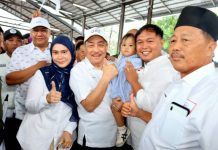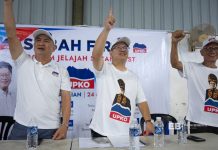KOTA KIINABALU: The claim that the setting up of the Federal Village Development and Security Committee (JPKKP) in Sabah is a form of Malaya supremacy on Sabah is baseless and confusing.
Sabah Parti Pribumi Bersatu Malaysia (Bersatu) Angkatan Bersatu Anak Muda (Armada) Chief, Encik Mohd.Isquzawan Datuk Arsit, said State Rural Development Minister Datuk Ewon Benedick has deliberately made a bad assumptions and accusation on the good proposal from the Federal Government.
He said the question of Malaya supremacy does not arise at all on Sabah because JPKKP is an organisation to be led and supported by the villagers themselves.
“I think Ewon does not understand the function of JPKKP. “Malaya Supremacy” does not arise because those to be appointed as JPKKP members are the villagers themselves who lives in the village concerned.
“Sabah Bersatu is shocked and annoyed by the baseless accusation made by Ewon who deliberately twisted the fact,” he said in a statement.
He was commenting on the statement made by Ewon who treated the proposal to set up JPKKP in Sabah as a form of Malaya supremacy on Sabah and definitely will not help in the nation building effort.
Ewon claimed village administration committee has been under the Sabah State Government purview all this while and any proposal to create a Federal administration committee like JPKKP is a breach of the autonomy.
Isquzawan said setting up of JPKKP is not something new in this country because prior to the 14th General Election, the villages in states under the opposition’s rule like Kelantan, Selangor and Penang were administered by the Federal Village Development and Security Committee (JKKKP).
He said under the previous Pakatan Harapan (PH) Government, JKKK has been rebranded as Village Community Management Council (MPKK) with the monthly allowance paid by the Federal Rural Development Ministry (KPLBM).
However, at the moment, matters related to the appointment, replacement and termination of MPKK are maintained under the state government power, while the management procedure and policies are supervised by KPLBM.
“Previously, MPKK allowance are paid by KPLB Malaysia. So is this also a form of ‘Malaya supremacy’ which were agreed upon by the State Government?” he questioned.
On Ewon’s objection that the setting up of JPKKP will become a wasted investment if the State Government do not allow development of land because it is still under the State Government power,
Isquzawan said the question of the Federal Government not respecting the State Government autonomy should not arise.
He said Ewon should realise and understand that the setting up of JPKKP is not meant to seize the power of the State Government on land or the villagers, because it is under the State Government power.
“How the power over State land is connected with the setting up of JPKKP at each village? MPKK also do not have power over land.
“The question is, what form of ‘economic breach’ the Federal Government would have committed by setting up JPKKP at each village in Sabah?
“Was Ewon merely yawning, because the MPKK Chairmen have not received their respective allowance payment from his Ministry and the State Government?” he stressed.
The Federal Government has stopped the allocation for the allowance payment of the MPKK in Sabah after the Warisan-led Government chose to become an opposition at the Federal-level.
Isquzawan said the Federal Rural Development Minister Datuk Dr Abd Latiff Ahmad had said that the purpose of JPKKP to be formed is to ensure continuity of development in the rural area and to act as a bridge between the government and village community.
According to him, the Federal Government’s objective is to strive hard to develop the rural sector in Sabah which is still lagging far behind.
He said the appointments of MPKK in Sabah by the Warisan Government were also filled with political elements to the extent that it affects its functions, duties and services to the people at the grassroots-level.
“This can be seen during the distribution of the State Government’s “one off” Covid-19 food and other assistance where many people, particularly those at the grassroots level, who are qualified, poor but did not receive the assistance,” he stressed.-pr/BNN






